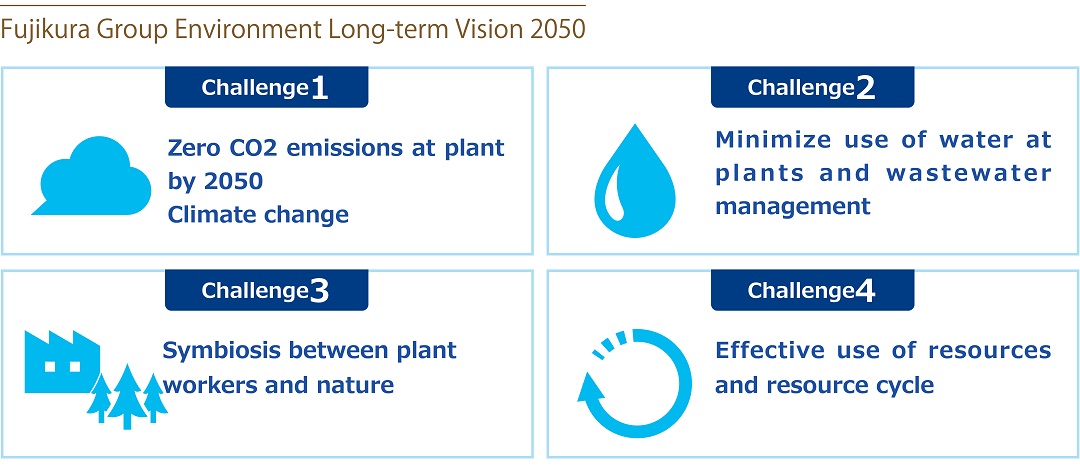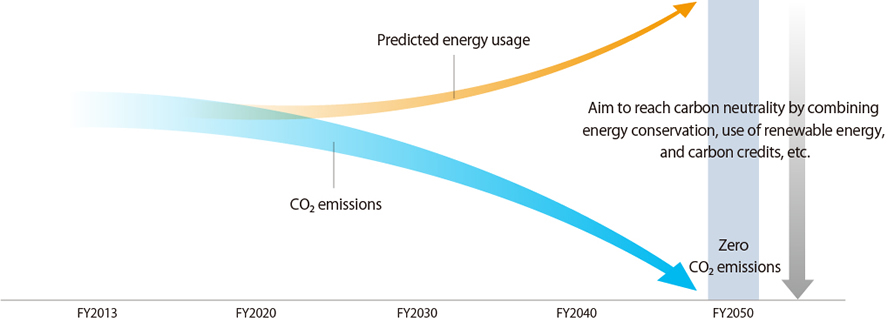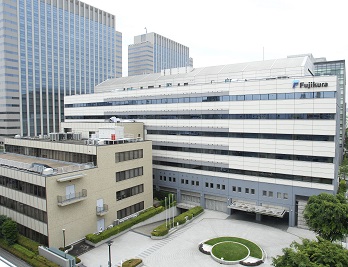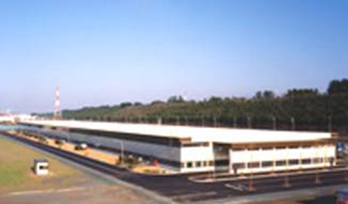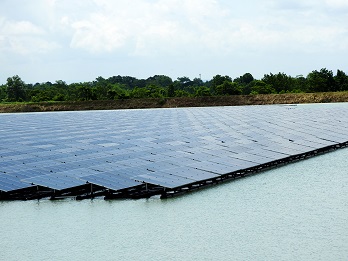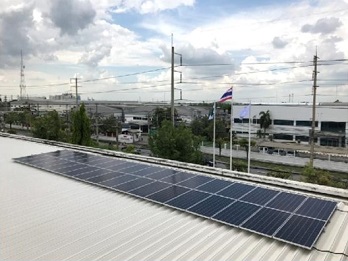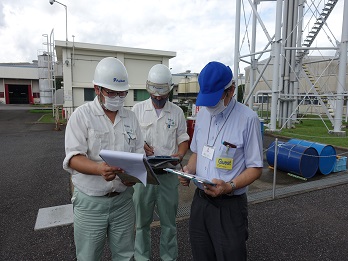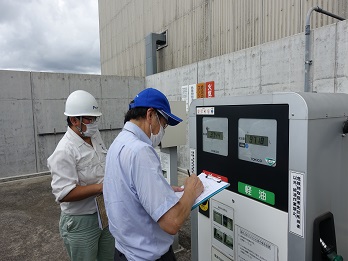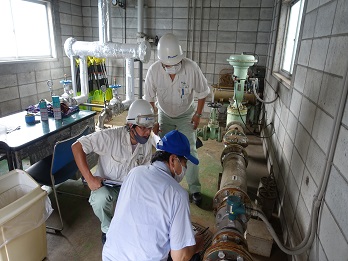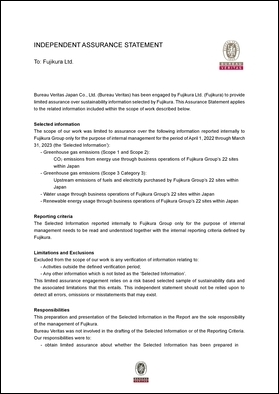Environmental Policy and Targets
Global Environmental Charter
We established the Fujikura Global Environment Charter in 1992 and revised it in April 2013, adding the conservation of biodiversity as an important environmental issue to address.
Fujikura Group Global Environmental Charter
Established: April 1992 / Revised: November 2020
- Foreword
- With the rapid developments in science and technology, human civilization is making dramatic leaps forward, and we have become able to enjoy affluent lives. On the other hand, however, we have seen progress in environmental destruction on a global scale, such as global warming, destruction of the ozone layer, acid rain, depletion of rainforests, desertification and marine pollution, and we have reached the stage where the existence on the earth not only of mankind but of life itself is in serious peril. Increasingly complex and diversified social systems are deeply involved with these global environmental problems, and corporate activities are undeniably one of the major factors behind these problems. At Fujikura Group we are strongly aware that our operations are closely related to the global environment, and are making the utmost effort to protect the global environment.
- Basic Philosophy
- Fujikura is expanding its basic policy of "establishing affluent and cheerful lifestyles through the efforts of all employees of the Fujikura Group"
on a global scale, and is committed to company-wide activities to protect the earth as one of management's top priorities.
- Action Guidelines
- In all areas of corporate activities, each individual must act giving priority to conserving the global environment.
- 1. Organization and Administration
-
Put in place internal organizations and administrative systems for environmental conservation which relevant directors will be responsible for.
Each organization must clarify its environmental goals and promote planned and sustained improvements. - 2. Improve Environmental Management Standards and the Level of Environmental Management
-
In addition to observing the environmental regulations of the government and local governments, establish voluntary management standards
in an effort to further improve the level of environmental management. Carry out environmental audits regularly and attempt to maintain
and improve self-management. - 3. In Operations
-
Endeavor to conserve the environment in all stages of operations, to encompass development, design, purchasing, production, execution, sales, distribution and disposal. Furthermore, tackle energy saving, conservation of resources, promotion of recycling, and reductions in waste and substances that place a load on the environment, and work to prevent environmental pollution.
- 4. Appropriate Provision of Information to Customers
- Provide users of products with information, such as instructions for appropriate use, recycling and disposal.
- 5. Contribution to the Local Community
-
By actively participating in conservation activities for the local environment, work to bolster mutual understanding and relationships of cooperation,
and make a contribution as a member of the local community. - 6. Overseas Operations
-
While observing environmental standards in the countries we operate in goes without saying, also set our own voluntary management standards
in a bid to conserve the environment. In addition to actively utilizing the technology and know-how for environmental conservation, work to develop personnel involved in environmental management. - 7. Public Relations and Educational Activities
-
Carry out educational and PR activities for all employees in a bid to promote understanding of conservation of the global environment,
and to improve environmental awareness. - 8. Preservation of Biodiversity
- Recognize the importance of biodiversity in the global environment and work to preserve the world’s ecosystems.
Fujikura Group Environment Long-term Vision 2050
We established the Fujikura Group Environment Long-term Vision 2050 in 2016, taking into account the adoption of the Paris Agreement at the 2015 United Nations Climate Change Conference (COP 21) and the goal to reduce CO2 emissions 80% by 2050 (compared to 2015) in Japan’s Plan for Global Warming Countermeasures released in March 2016.
Fujikura Group Environmental Challenge 2050
Enacted: July 19, 2016
- [Preface] Four Challenges for 2050
Since its founding in 1885, the Fujikura Group has created value for customers and contributed to society through its "Tsunagu" technologies, including power cables, electric wiring parts, and automotive parts. In addition, as a corporate group that is friendly to people as well as the global environment, we began rolling out CSR initiatives in 2009 to achieve a sustainable society.
According to forecasts by international institutions, including the OECD, the Earth is currently heading in a dangerous direction. Weather anomalies, due to climate changes triggered by greenhouse gases, are threatening our everyday lives. In addition, environmental issues, including a shortage of useable water, depletion of resources, serious air pollution, and destruction of biodiversity in tandem with an increase in population and economic activities, are becoming widespread and severe on a global scale.
The Fujikura Group is a global citizen that conducts operations globally. In light of the aforementioned trends, looking toward the future in 2050, the Fujikura Group plans to undertake four challenges to minimize its impact on the environment.
Furthermore, once the Group reduces its environmental burden to zero, in 2065, the year in which Fujikura will mark the company's Fourth Founding, the Group will embark on measures to bring about positive benefit to the global environment.
- Goals & Main Activities of the Four Challenges
-
[Challenge 1] Zero CO2 emissions at plant by 2050 ⇔ Climate change
We aim to reduce our CO2 emissions by 2030 by an amount that surpasses the level required of the industry by the government (versus FY2013).- [Main activities]
(1) Improve environmental performance of products
(2) Use renewable energies
(3) Employ hydrogen energy
These are Fujikura’s three pillars for reducing CO2 emissions
[Challenge 2] Minimize use of water at plants and wastewater management ⇔ Water risk
-Do not use, reuse, and return to nature clean-[Challenge 3] Symbiosis between plant workers and nature ⇔ Destruction of biodiversity- [Main activities]
(1) Minimize water use during the production process and reuse water
(2) Recycle plant wastewater, including the use of rainwater
(3) Treat wastewater to a level of quality that is safe and sufficient for its return to nature, etc.
[Challenge 4] Effective use of resources and resource cycle ⇔ Depletion of resources and increased waste- [Main activities]
(1) Enrich and use the Millennium Woods biotope garden at Fujikura sites around the world
(2) Promote regional activities to preserve the natural environment
(3) Promote natural environment education for future generations, etc.
- [Main activities]
(1) Use eco-materials
(2) Environmentally-friendly and long-life product manufacturing
(3) Develop recycling technologies, etc.
- [Main activities]
- Challenge for the 4th 60 Years of Leadership
- Furthermore, once the Group reduces its environmental burden to zero, in 2065, the year in which Fujikura will mark the company’s Fourth Founding, the Group will embark on measures to bring about positive benefit to the global environment.
|
|
Roadmap for Zero CO2 Emissions
The first challenge found in the Fujikura Group Environment Long-term Vision 2050 is to achieve carbon neutral plants by 2050. We have established the following roadmap to reduce our carbon footprint aimed at meeting this challenge. Toward this end, we will implement specific measures that include promoting energy conservation, using non-fossil fuels, certifying carbon neutral plants, and establishing an energy conservation fund in-house, among others.
CO2 targets established for each fiscal year
- FY2020: Reduce emissions at least 3% compared to FY2013
- FY2030: Reduce emissions at least 40% compared to FY2018
- FY2050: Eliminate emissions from plants
Roadmap for Reducing Total CO2 Emissions (Japan)
|
|
Initiatives to achieve the roadmap
The Fujikura Head Office started using Aqua Premium Power in September 2017, and the Fujikura Diamond Cable Fukui Plant began using renewable power in April 2018. Overseas, FETL's Kabin Buri plant in the Kingdom of Thailand installed a floating solar panel in the pond of the factory and started supplying electricity in 2019.In addition, roof-mounted solar panels are being installed at Ayutthaya Factory 1 and Navanakorn Factory 3.
|
|
|
|
|
|
|
External Collaboration
|
The Fujikura Group engages in various kinds of communications about response to climate change with outside experts and is using this information in future initiatives.In 2021, we held two dialogues with members of the Sustainability Strategy Council, institutional investors, and others. |
|
Statement of Support for TCFD*1 Recommendations, Participation in RE100*2, and Commitment to SBTi
The Fujikura Group signed the statement of support for the recommendations published by the Task Force on Climate-related Financial Disclosures (TFCD) in 2017. We will contribute to the realization of a sustainable society by analyzing the risks and opportunities posed by climate change and disclosing relevant information to stakeholders.
In addition, we are a member to RE100, an initiative of companies with the goal of procuring 100% of electricity for business activities from renewable energy. We have created and are implementing a roadmap for achieving the goal of zero total CO2 emissions from our plants by 2050.As part of this, we are aiming for 100% renewable energy by 2050, and have set an intermediate target of 45% in 2030 and 90% in 2040.
Fujikura is committed to setting science-based targets with the goal of obtaining validation of the targets we set by the Science Based Targets initiative (SBTi) for participating companies. SBTi validates greenhouse gas (GHG) reduction targets set by companies for target years from 5 to 15 years in the future that are compliant with the level required under the Paris Agreement (aimed at keeping the increase in global temperature to 1.5ºC or well below a 2℃ increase in global temperature compared to before the industrial revolution).
*1 TFCD: An acronym for Task Force on Climate-related Financial Disclosures, an organization established by the Financial Services Board with the participation of the central banks and financial regulators of major countries. TFCD has announced guidelines on disclosures based on predictions of how climate change will affect corporate finance.
*2 RE100: An initiative launched in 2014 by The Climate Group (TCG), an international environmental NGO. The name RE100 stands for Renewable Energy 100%.
|
|
Fujikura Group Environmental Management Activity Guidelines
FY2021 Activity Targets and Results as well as FY2022 Targets
Fujikura Group Guidelines for Environmental Management Activity
| Subjects | Guidelines for FY2021 to FY2025 | Areas |
|---|---|---|
| CO2Emission | ■CO2Emission Reduction ・CO2Emission: Total CO2 emissions: 350,000 tons/year or less (FY2025)(Reduce total CO2 emissions in FY2025 by at least 20% from FY2018) |
Japan Overseas |
| ■Improved production efficiency(Energy consumption) ・Energy consumption rate: Improve energy consumption per unit of production in FY2025 by at least 10% from FY2020 |
Japan Overseas |
|
| ■Improvement of product distribution efficiency ・Energy consumption rate: Improve logistic energy consumption per unit of products in FY2025 by at least 1% from FY2020 |
Japan | |
| Water Risk | ■Improvement of water consumption per unit of production ・water consumption rate: Improve water consumption per unit of production in FY2025 by 5% or more from FY2020 |
Japan Overseas |
| Biodiversity Conservation | ■Contribution to biodiversity through effective use of natureat a local factory ■Promote local environmental conservation activities |
Japan Overseas |
| Resources | ■Reduction and effective use of resources | Japan Overseas |
| ■Reduction of waste emissions from production ・Reduce waste emissions per unit of production in FY2025 by at least 5% from FY 2020 |
Japan | |
| ■Continuation of zero waste emissions | Japan | |
| ChemicalSubstances | ■Reduction of substances with environmental impact ・Major chemical substances specified by Pollutant Release and Transfer Register(PRTR) law:Reduce both release ratio and transfer ratio per unit of production in FY2025 by 5% or more from FY2020 ・Atmospheric emission of Volatile Organic Compounds(VOC) per unit of production:Reduce atmospheric emission of VOC per unit of production in FY2025 by 5% or more compared to FY2020 |
Japan |
| Products, GreenProcurement | ■Enhancement of environmentally friendly products ・Number of registered green products:(Fujikura Group) 60 or more per year ・グRatio of green products to total sales: 50% or more in FY2025 |
Japan Overseas |
| ■Promote the management of chemical substances contained in products in the supply chain(Green procurement and compliance with prohibited substances) | Japan Overseas |
|
| Environmental Trouble | ■Reducing harmful environmental impacts ・Zero environmental accidents occurrence:0件 |
Japan Overseas |
*Definition of Zero Waste Emissions: The complete elimination of waste sent to landfills or waste processed using simple incineration.
Third-party Verification of Environmental Performance Data
The Fujikura Group requests an independent third-party to verify its environmental performance data every year. In FY2021, Fujikura verified energy use, water use, and CO2 emissions at the Fujikura Headquarters and 20 production locations in Japan.
Overview of FY2021 Data Verification
- Boundary*: Fujikura Headquarters and the 20 production sites of consolidated subsidiaries in Japan
- * Covers at least 99% of CO2 emissions and water use by the entire Fujikura Group in Japan
- Period of data: April 1, 2021 to March 31, 2022
- Scope: (1) Scope 1 & 2 energy-derived CO2 emissions, (2) Scope 3 and CAT 3 CO2 emissions, and (3) water usage, associated with business activities
- Verifying company: Bureau Veritas Japan Co., Ltd.
|
*The image shows the state of the 2019 examination (all remote examinations in 2021) |
|
|
Involvement in industry groups on climate change measures
The Fujikura belongs to the Japan Electric Wire Industry Association (JCMA), which is an industry group of Japanese electric wire manufacturers.
JCMA is working on the "Voluntary Action Plan on Environmental Conservation" in order to contribute to the achievement of the "Low Carbon Society Action Plan" set forth by the Ministry of Economy, Trade and Industry and Nippon Keidanren.JCMA established an environmental committee to find solutions for environmental problems such as response to climate change, waste reduction, and other problems specific to the electric wire and cable industry.Regarding climate change countermeasures, we have set medium- to long-term targets such as 2020 and 2030 targets, mainly focusing on reducing energy consumption related to the manufacture of metal cables and optical cables, and have incorporated them into the environmental targets of each company.
We are also working to promote the recycling of industrial waste toward the formation of a sound material-cycle society.
In addition to the targets mentioned above, the Fujikura Group strategy encompasses joining the RE100, declaring our support of the TCFD recommendations, and committing to SBTi.
To share these goals and activities, we have established the Fujikura Group Global Environment Committee, in which representatives of all business divisions and major bases participate.We are confirming the consistency with the activities of each department and proceeding with climate change measures, including changing plans as necessary.
